 |
 |
 |
 |
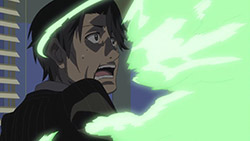 |
 |
 |
 |
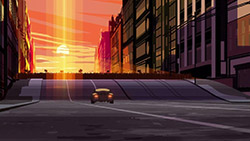 |
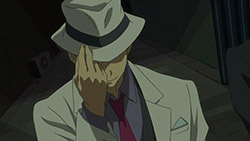 |
 |
 |
 |
 |
 |
 |
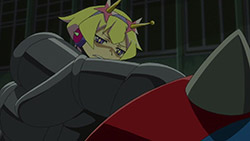 |
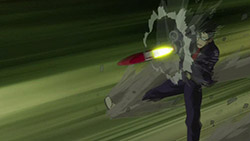 |
 |
 |
 |
 |
 |
 |
 |
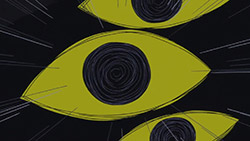 |
 |
 |
 |
 |
 |
 |
 |
 |
 |
 |
 |
 |
 |
「新宿擾乱」 (Shinjuku Jōran)
“Riots in Shinjuku”
If there was ever any doubt about Concrete Revolutio having a method to its madness, the let it be dispelled by this season finale. Indeed, it’s always been fairly plain, to me at least, that Concrete Revolutio, even when it was jumping around its continuity, was building a bigger picture; it had been especially clear with the last few episodes when we were given some key pieces of the puzzle, and as of this week I dare say we have a full view of everything that lead to Jirou leaving the Superhuman Bureau and why the ‘future’ of Concrete Revolutio looked so bleak. All in all, I found that everything came together in fairly satisfying manner, at least to the extent that I don’t have any burning questions that will eat at me while waiting for the second season. And of course, it’s not just about the plot tying up its loose ends. The callbacks (call-forwards, whatever) to all the previous superhumans of the series was fun, even if the part where they band together by the power of song may have been a tad cheesy.
The other important thing for a finale to cover (besides the action spectacle and weird bondage titillation for the popcorn crowd, of course) are the themes that have arched over the story, and I think this is doubly true for Concrete Revolutio, where thematic consistency has been what was keeping its seemingly non-contiguous parts together. So with the giant government conspiracy uncovered, the implication of the greater good versus personal liberty, and a stubborn clash of both mecha and values, how are we to resolve the conflict in ideals? The unfortunate answer that Concrete Revolutio seems to give us is that might makes right. Claude/Jin and the students he inspire seek violent revolution. The government suppresses it with ninja police in tachikomas. Jin and his foil/prototype/whatever scrapyard fight not for the moral high ground, but for savage power dominance. Indeed the moral high ground—the one that stands against violence and destruction—is brutally trampled underfoot. Isn’t that why Jirou activates his berserk kaijuu powers, even though it will only cause collateral damage? As Concrete Revolutio posited in the immortal family episode, it is the natural course to seek either to control or destroy. Well, option A has failed spectacularly. Good thing plan B always works!
Ironically enough, Jirou does actually sort of resolves the crisis, but not by playing the hero. As the villain, or rather as a firey destructive force, he brings both sides together to fight him. It’s the Watchmen influence again—the solution for world peace is to unite all in fear of a greater threat. And get this: in the world of Concrete Revolutio, a world where WWII scientists went into kaijuu research instead of nuclear research and where the Enola Gay crashed, Jirou was the literal Little Boy. This is the strangest form of MAD I’ve ever seen proposed.
It’s no wonder that it was assumed, in episode 03, that the two androids would come together into a humanoid bomb, because that’s exactly what Jirou is. Shouldn’t people be more concerned that he’s now running around on his own? At the same time, aren’t all superhumans of sufficient power humanoid superweapons? It’s just more, er, obvious with Jirou. Well, I’m sure it’s just more for Concrete Revolutio to address in its second half. it has no shortage of material, that’s for sure, and that’s a good thing.
Epilogue:
 |
 |
 |
Final Impressions ~ Who watches a show about watching the watchmen?
I hesitate to write something as definitive as ‘final impressions’ for Concrete Revolutio, considering it’s been hardly final (and that I don’t put much stock in my impressions). For a show that gets offhandedly derided as being confusing or disjointed, Concrete Revolutio is very clearly a story of two halves, one pre- Jirou leaving the Superhuman Bureau and one post-, woven together at the risk of being ‘confusing’ exactly because of how tightly joined the pieces are. I won’t deny that Concrete Revolutio has at times been rather advant garde with its continuity, but its future is still very plainly a product of its past. We have now resolved the pre- Jirou leaving era. But that’s only half the tale. And so it won’t be entirely fair to judge Concrete Revolutio on only that. Simply dropping the discussion here would be boring, though, so I’ll try for something anyway.
I’ve touched on the point that some found Concrete Revolutio confusing multiple times, and you may have noticed that I seldom agree with it. That’s partly because I’m a hardened anime apologist and partly because I didn’t really experience the same confusion myself. Perhaps it’s because I, in my capacity as a blogger, am forced to pay extra attention to the show I’m watching (y’know, so I can write all the ranting you’re reading right now), and to a degree that can’t be expected of your average viewer (unless you’re all taking notes at home about your anime as well). In fact, I’m sure that’s at least part of it. But I also think it’s because Concrete Revolutio is a show built on its many, many references to other pieces of popular media, and unless one is familiar is them they may not be able to connect all the mental dots that Concrete Revolutio expects of us. I won’t pretend that I have the kind of nerd cred to recognise everything that Concrete Revolutio was referencing, but I felt like my general knowledge greatly assisted my understanding of the show. It’s like with a parody; one isn’t going to appreciate the jokes unless one is familiar with the material being parodied, or in this case, the material being homaged/deconstructed/whatever.
Viewed in this way, I think Concrete Revolutio was put together very well. It managed to string together all the various genres and franchises it was referencing adeptly, and then strung all that to actual history. I may have stated this before, but I think setting Concrete Revolutio in the political atmosphere of 1968 was an enlightened choice (but, again, a choice one would only appreciate if they caught the references to history, or are just old enough to remember the time). In fact, I think I would describe Concrete Revolutio as otaku pandering done right. I know there are some who are disillusioned about the anime market of today, about how so many shows are transparent appeals to the otaku demographic. But it’s also true that culture shapes art, and when there’s a predominant culture buying your product… it’s difficult to resist just laying on the hard sell, is what I’m saying. But I think Concrete Revolutio taps into this culture in the healthiest way, making use of the shared childhood of every nerd. Robots, kaijuu, masked heroes—it’s a shared fictional heritage that should be used more. I’m sure the staff behind Concrete Revolutio are all giant nerds as well—my people. Which makes Concrete Revolutio, in essence, anime fans talking to anime fans. I’ve enjoyed our conversation so far. I hope it’ll be as full of geek love when it returns from its season break.

As far as the series construction goes, it reminds me of Boogiepop or Serial Experiments Lain. Obviously a different topic altogether, I just mean in terms of how things are put together.
Easily the dark horse this season. It just keeps getting better and better with this excellent finale. It may not have the budget to look great but Concrete Revolutio has certainly the brains to pull off a series as ambitious and well executed as this.
I kind of disagree about it getting better. Concrete Revolutio is a great show (definitely going to watch the second part when it comes) but it didn’t get better until I understood what they were going for, and it became pretty good and entertaining. I agree though, even with a their budget and the art quality, they pulled it off in the end.
Episode 1 is by far the worst Concrete Revolutio episode and Episode 6 to a certain extent (for overextending side character’s exposure) but even the other earlier episodes are grounded and good enough to tell stories of their own. The moment we were able to understand what’s going on is the real payoff yet I can certainly tell that the story of Kikko, Earth-chan, the student rallies, the immortals, the guy who has his multiple selves due to time travel are good stand alones.
Even before the epic finale, the show is giving a consistent vibe about the post war commentary of Japan and its distrust of the American government.
I am really speechless about the fact that some people thought this show was/is “confusing” and “inconsistent”. Are people nowadays not able to understand a pro- or analepsis? If not, all the more reason to use them. Of course, there are a lot of hints I didn’t get either, but to not get the overall story?
I am so glad that something like this show still exists. I liked the artstyle, the music, and it was just an extremely intelligent series. I’ll certainly watch it again, looking for more hints.
Nowadays, where a 80%-stereotypical show gets praised for being less stereotypical than a 100%-stereotypical show, Concrete Revolutio felt like a breath of fresh air 😉
I think some viewers may have thought “this is too much”. Used to linear and chronological plots and, as you say, only a deconstruction of a trope per series (if there’s one at all), a story that jumps in time in every episode and is full of deconstructed tropes, in an unfamiliar and highly politicized setting (Japan in 1968) expects some effort from its viewers.
Which is good, of course. I’m not expecting every series to be like this, but anime can be more than the nth adaptation of a harem LN with swords.
To be fair, Concrete Revolutio moved pretty damn fast. There’s a lot more to miss than in your usual anime.
“Otaku pandering done right”. Best definition for this series, I think. Because common anime tropes can be more than cliches.
Concrete Revolutio has managed to analyze fiction tropes in manga and anime, the nuances of law, order, justice and freedom, superhumans and their impact on society, and all set in the protests of 1968. Which, imaginative and full of youthful optimism as they were, ended up with the government winning in the end, as that politician in the episode pointed out.
Because when the words touch close home is when Concrete Revolutio shows its best side. We have heard those lines before, haven’t we? The fine print of the law bringing up some disturbing implications. The authorities more interested in silencing the press than in solving the problems (coughfukushimacough), the ideals of a generation that didn’t live a war, heck, even that “you’re only going to cause trouble to the commuters”. Although I’m leaving with Claude’s line: “Defending my freedom disturbs the peace. Pursuing your justice violates my freedom. There is no single answer”.
There is Watchmen in there, but also Marvel’s Civil War, I think (or they were born with similar ideas in mind). It’s interesting that the episode ends in a high note: the law is rejected, Magical Girl Kikko is back, protestors and security officers worked together for a good cause… but that scene when we saw a broken Earth-chan is chilling and reminds us that there’s something rotten in that happy ending (if it’s Civil War in the end, I’m Team Earth-chan).
Looking forward to the next season.
I was actually rather pessimistic about that end, mostly because I don’t actually think the idea of the superhuman bill to be a bad one, Akita may choose decide to be less benign from now on, we know that superhumans are going to be vilified from now on, and we also know that Kikko is now going to spend years confused and sad about her missing Jirou-senpai.
But still, high five Team Earth-chan!
I understand the feeling. In my country it’s mandatory to get a ID card when you become 14 and registration is also needed to work in certain fields (doctors, lawyers, etc.), so I’m pretty used to registration as not a bad idea per se. Nevertheless, I understand that in countries where it’s not required (aren’t Japan and the USA in that situation?) it can be a touchy subject.
I think the main problem is the fine print, when laws include things that are not strictly part of the issue at hand (we all know examples, don’t we?), and fortunately it was addressed in CR. At first, the Japanese law seemed benevolent enough. However, when it essentially sets apart humans from superhumans legally (“once they are admitted as a superhuman, human laws no longer apply”) and the later becomes a convenient label for very different individuals (“potential criminals, dangerous thinkers, different races”), the risk of abuse becomes clear.
A similar thing happened in Marvel’s Civil War (in comics). Privacy? Secret identities? Government control? I’m more worried about the fine print that says that every superhuman has to work as a superhero. Where is my right to choose a job? Legally enforced slavery matters to me much more than the government having my personal data.
Oh, of course, I’d be very much against a, at the extreme, superhuman apartheid or something, but just letting them run around willy-nilly is no good either. At the very least, I think the superhuman bill offered a better alternative than the current system, where the government just tries to have everyone pretend superhumans don’t exist—which is precisely how they get away with things like weaponising them or experimenting on them in secret labs. If I recall correctly, the bill banned the military use of superhumans except on a voluntary basis. That’s something.
Fascinating show, even if, admittedly, I was quite confused with the beginning episodes.
I’m very much looking forward to the 2nd cour in the spring, though. Thanks for blogging it, Passerby.
Always a pleasure.